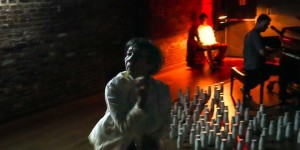IMPRESSIONS: "Love Alone Anthology Project" by Keith A. Thompson at La MaMa Moves! Dance Festival

Presented by La MaMa Moves! Dance Festival
Love Alone Anthology Project by the danceTactics performance group
Choreographed and Directed by Keith A. Thompson
Inspired by the writings of Paul Monette
Presented by the danceTactics performance group
Performed by Clarence Brooks, Shawn Brush, Aiden Feldman and Brendan McCall
Lighting Design by Joe Levasseur
Video Projection Design by David Fishel
Photographic Art by Robert Flynt
Original Music by Albert Mathias, Maesa Pullman and Dalal Bruchmann
April 10 - 13, 2025
“Bring it into who we are in this moment,” said Nicky Paraiso, the beloved curator of the La MaMa Moves! Dance Festival, recalling the AIDS crisis of the 1990s in his opening remarks. Keith A. Thompson’s Love Alone Anthology Project does just that.
Drawing from the searing stream-of-consciousness poems of Paul Monette, the work — intimate, embodied, and quietly insistent — is a living elegy to Monette’s late partner, Rog, and to all those who lost their lives to AIDS. Thompson’s danceTactics performance group presented the dance in The Downstairs theater on April 10 - 13, 2025.
The piece unfolds as a series of vignettes, danced by Clarence Brooks, Shawn Brush, Aidan Feldman, and Brendan McCall, four men physically and emotionally attuned. Every poem sparks its own vividly emotive world. A metal folding chair serves as a ghostly stand-in, a marker for absence.

In the opening scene, Feldman stands at the end of a long table (perhaps representing all who sat there and are now gone). He wears red pants and a plaid shirt, while Brush, dark-haired and bearded, slouches in a chair. He slips off, arm tucking behind his back, hand wrapping his head as he recites: “Pain is not a flower pain is a root and its work is underground.”
The two men slap their chests. “Gardenias,” they exclaim, just as a few notes of song drift in. Billie Holiday’s voice coordinates with the lines about her in the poem. Behind the men, brightly-colored projections of male profiles, eventually understood as the dancers themselves, flicker in and out of focus, rapid-fire. (David Fishel and Robert Flynt developed the captivating images and film.)
Elsewhere, Brooks peeks out from behind the upended table as photographs of naked men standing and squatting in everyday positions flash across the screen. Scribbled text overlays the images, and then vanishes. In near silence, Brooks collapses the table and slowly pushes it offstage. He rubs his fingers together as if recalling something that’s no longer there. At another juncture Brooks places red framed glasses over his eyes, pulls out the book of poetry, and calmly and casually reads out loud, as if this were an everyday occurrence.

Clarence Brooks and Shawn Brush (background) in Love Alone Anthology Project. Photo by Steven Pisano
McCall brings a raw tenderness to The Very Same, saying, “the wrongest of the wrong thing was said that day,” while leaning on a chair like it’s both a burden and a companion. He strokes its edges, before cradling it and walking off.
The younger dancers bring explosive movement — riveting rolls, leaps, and sweeps across the floor. Brooks, in his delicacy, and McCall, with his expressive face, individually hold the piece’s emotional core. In Half Life, Brooks and McCall dance in unison, fingers rippling, arms swinging, stepping side to side. A recorded voice says, “I get up and half of me doesn’t work.” McCall slices his hand across his body and says, “severing East from West,” as if leaving a companion behind. Brooks reclines slowly onto McCall, his weight settling along the length of him, as Brooks looks clear-eyed toward us.

Feldman and Brush return in white trunk underwear and button-down shirts. Brush lifts Feldman; they toss one another, and Feldman bends backward over Brush’s knee. Chairs slide and are jumped on. The men yell, “We will not be bowed down, or erased by this. All there is, is love.” The music warbles. Feldman climbs from a chair onto Brush’s shoulders and then falls sideways. They run. The dual projection screen flashes images — fleeting gestures, faces, and bodies. The stuttering sound repeats and then cuts out leaving only flickering film. Words are projected directly onto the dancers’ moving bodies. The intensity builds, then breaks into the mundane: “There’s chicken from Friday night. We ate.” As the men sit quietly together in the chairs, we hear, “Singing your perfect name til the night’s gone.”

It could be easy to think of a dance about AIDS in 2025 as a relic. But Love Alone Anthology Project insists otherwise. It honors a generation of men who died too soon, and it asks us to carry their memory in our bodies, not as a history but as a presence.













